In 1978, Pina Bausch changed her modus operandi.
Peter Zadek, director in Bochum, invited her to create a modern version of Shakespeare’s Macbeth. However, a large part of the ensemble was used to a more conventional interpretation. They couldn’t follow her lead.
The premiere of this collective brainstorming, on 22 April 1978 in Bochum, under the title Er nimmt sie an der Hand und fuehrt sie in das Schloss, die anderen folgen… (He takes her by the hand and leads her into the castle, the others follow…) was almost drowned in the loud calls of protest from the audience.
However, Pina didn’t let the public opinion deter her from following this new path. She had finally found her true artistic expression. Poetic pictures and movements. A choreography which never shied away from breaking boundaries. And the courage to look at harsh realities whilst at the same time inviting the audience to dream.
In their dance performances, the Wuppertal Dance Theatre ensemble spoke to their audiences about deep emotions, fears and adversity, passion and longing.
Under Jooss’s direction, Pina Bausch learned to master the classical form of ballet whilst at the same time venturing into the yet unexplored spaces of creative freedom within the artform.
At the Folkwang Academy, all the creative arts were housed under one roof. Dance, opera, music, drama, sculpting, painting, photography, design, and many others. Pina found much inspiration in her surroundings which she later used in her work as a choreographer.
At the age of eighteen, Pina Bausch received the Folkwang-Leistungspreis (an award for outstanding achievements in dance). At the same time, she was awarded a scholarship from the German Academic Exchange Program which allowed her to study for one year at the Juilliard School of Music in New York.
Furthermore, as a dancer, she worked with Paul Taylor, Paul Sanasardo, and Donya Feuer.
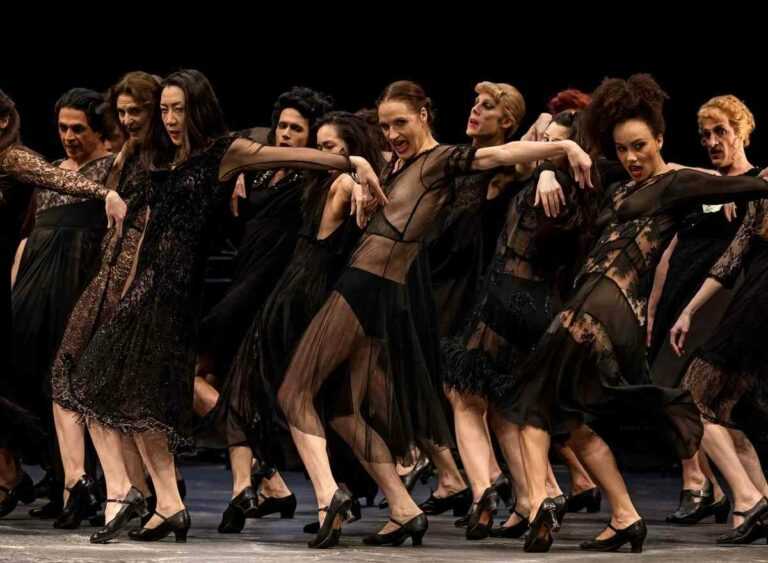 Dance Theatre Wuppertal
Dance Theatre Wuppertal
Whenever possible during her time in New York, Pina went and watched as many performances as she could. In her enthusiasm for the great city’s artistic diversity, she then decided to prolong her stay for another year. Even if that meant that she had to finance this second year by herself.
A decision which soon proved to be the best Pina could have taken when Antony Tudor hired her for the Metropolitan Opera. Her experiences in the traditional world of opera as well as her ever-stronger developing love for Jazz ended up influencing Pina throughout her career.
Under Pina’s lead, they were not only understood the world over. They also started an international, choreographic revolution.
And no matter how raw and honest any of Pina’s productions looked at the human condition and our every day lives, they always left space as well to communicate to the audience, “We hear you. We see you. You must take responsibility for your own lives. But you are not alone in your struggle. Life, in all its extremes, its ups and downs, is worth living.”
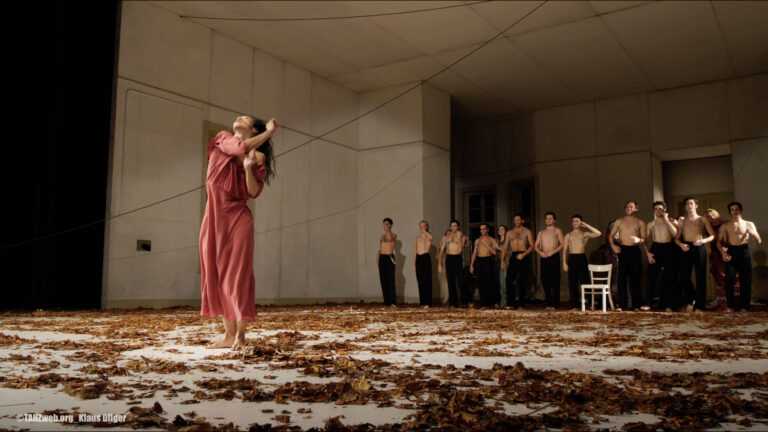 Blaubart – Dance Theatre Wuppertal
Blaubart – Dance Theatre Wuppertal
In January 1980, Pina’s life partner Rolf Borzik died. Especially in the beginning of the Wuppertal Dance Theatre, his set and costume design helped forge the face of the company. After his death, Peter Pabst took over as set designer, Marion Cito as costume designer.
Sometimes, the stage looked like an old flat. At other times, it reminded more of an elegant-minimalistic Japanese design, with simple wooden floors.
The costumes could be anything from elegant to bizarre. From an evening gown to a child-like combination of unrelated clothing items.
At first, the humor and beauty of Pina Bausch’s productions, hidden under a more immediate ugliness, were often overlooked. But, with the years, her creations were more deeply understood.
For Pina Bausch, any music which was able to trigger and express deep emotions in people was equal to all other genres of music. No matter what the background.
Towards the end of her second year in New York, Kurt Jooss asked Pina to return to Essen. He had successfully revived the Folkwang Ballet (which later became the Folkwang Dance Studio).
Pina returned and danced in Jooss’s old and new choreographies.
At this point, she also functioned as his assistant choreographer. Which soon developed into her choreographing own productions as well, like Fragment or Im Wind der Zeit (In the Wind of Time). For the latter she was awarded 1st place in the Choreography Competition in Wuppertal in 1969.
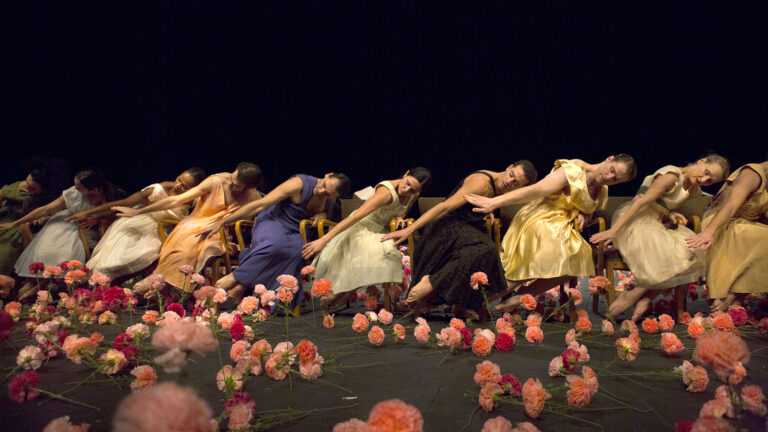 Carnations – Danse Danse
Carnations – Danse Danse
Afterwards, Pina Bausch became highly sought after. She worked as a guest choreographer for a few companies. In the season of 1973/74, the artistic director of the Wuppertal Ballet hired her as lead choreographer.
Pina quickly developed new genres. With Iphigenia on Tauris (1974) and Orpheus and Euridice (1975) she created two dance operas.
With Ich bring Dich um die Ecke (1974) she introduced popular music. In Komm Tanz Mit Mir she used old German folk songs. And in Renate Wandert Aus (both 1977) she played with the cliches of operetta.
One of Pina’s greatest milestones was her choreography of Igor Stravinsky’s Le Sacre du Printemps (1975).
The performance had an incredible emotional impact and a physical immediacy which became one of Pina’s trademarks. Up until then, this extreme intensity and rawness onstage had been unheard of and unseen in Germany.
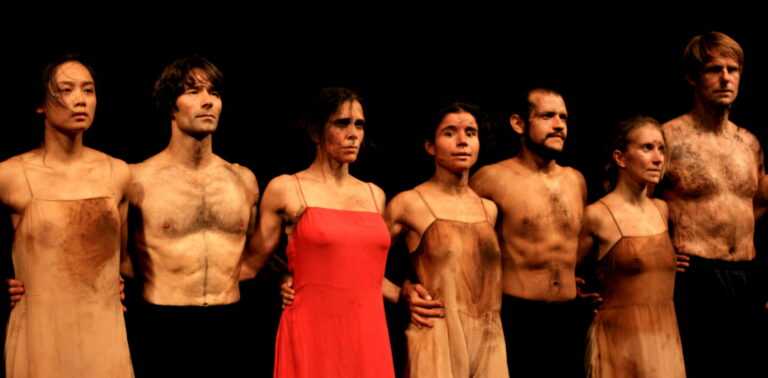 Le Sacre du Printemps – Dance Theatre Wuppertal
Le Sacre du Printemps – Dance Theatre Wuppertal
Thus, Pina’s choreographies shocked audiences as well as the press in the first few years in Wuppertal. There was pain in the honesty of her productions.
For example, many who watched Pina’s Herzog Blaubarts Burg (1977) which has music passages that are repeated over and over, perceived the experience as torture.
Thankfully, Pina’s productions also often reflected her good sense of humor which then made it easier for audiences to digest what they saw.
Pina’s Dance Theatre wasn’t about provocation. It was about reflecting life as we know it. As Pina put it, it was about “something, in which we can meet.”
The more international the Wuppertal Dance Theatre became the more international co-productions were developed. For example, Tanzabend II with Madrid, Nur Du with Los Angeles, Der Fensterputzer with Hong Kong, Agua with Rio de Janeiro, Ten Chi with Tokyo, Rough Cut with Seoul, to name only a few.
The very last co-production was with Chile in 2009. A new creation which Pina herself couldn’t name anymore.
At the same time, it never was a theatre which wanted to teach. Rather, Pina’s creations were always simply trying to re-produce the elementary experience of life. It was a theatre free of ideologies or dogmatism. A humanistic theatre. A theatre, which wanted to look at all facets of our world and lives without prejudice.
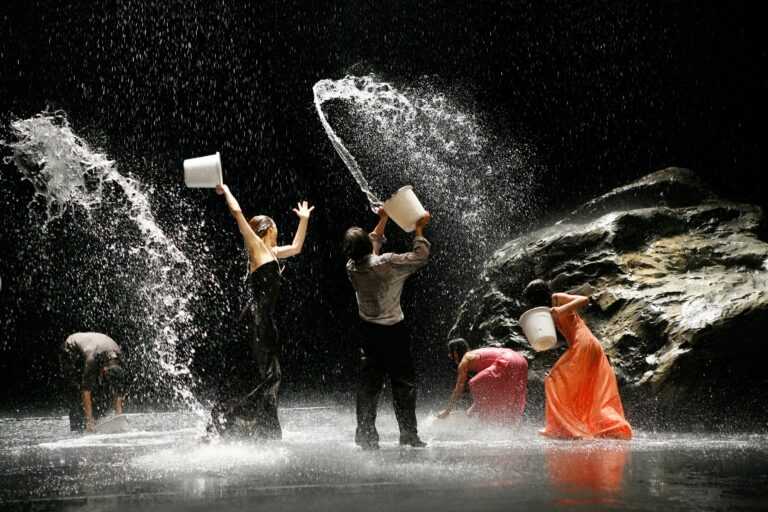 Full Moon
Full Moon
Pina Bausch received many awards throughout her lifetime. For example, the Bessie Award in New York (1984), the German Dance Award (1995), the Berlin Theatre Award (1997), the Praemium Imperiale in Japan (1999), the Nijinski Award of Monte Carlo, the Golden Mask in Moscow (2005), and the Goethe Award in Frankfurt/Main (2008).
The government of Germany even presented Pina Bausch with an official medal of honor, the Grosses Verdienstkreuz (1997). France awarded her two official titles, the Commandeur de l’Ordre des Arts et de Lettre (1991) and the Knight of the Legion of Honour (2003). Additionally, many universities bestowed her with honorary doctorates.
Pina Bausch passed away on June 30, 2009. She will forever be remembered as one of the most important choreographers of the twentieth century.
Official Trailer of the documentary film “Pina”, an unforgettable portrait by Wim Wenders (an absolute must see!!)
This article was compiled from a myriad of sources from the Internet.
сказка
Когда в 1996 году Вуппертальская опера объединилась с музыкальным театром в районе Гельзенкирхен для театра Шиллера NRW , он присоединился к труппе Пины Бауш из ассоциации с Вуппертальской оперой, а в 1999 году — как Tanztheater Wuppertal Pina Bausch GmbH независимо. Комплексный контракт на поставку с театрами Вупперталя, которые независимы с 2001 года, регулирует кадровое и материальное обеспечение театра танца театрами. Ее поддерживал консультативный совет ; Андреас Бергманн был председателем Консультативного совета Tanztheater Wuppertal Pina Bausch GmbH . Город Вупперталь владеет 95% компании GmbH, а 5% принадлежит Саломону Баушу, сыну покойного художника.
Объекты
Плакат в Elberfelder Schauspielhaus
В 2003 году оперный театр в Бармене был лишен лицензии на эксплуатацию из-за постоянных серьезных нарушений безопасности . Это вынудило местных политиков решиться на перепланировку. Вот почему театр танца Пины Бауш и Вупперталер Бюхнен жили в Elberfelder Schauspielhaus до его открытия . Театр танца играл (в отличие от театров Вупперталя) в той же степени, что и раньше, в двух театрах. Многие произведения Пины Бауш, премьера которых состоялась в оперном театре , были переданы в театр, что было освоено благодаря большому гастрольному опыту. В 2009 году оперный театр был вновь открыт после ремонта. Из-за «драматической бюджетной ситуации» возможность открытия двух театров примерно одинакового размера (750 и 820 мест соответственно) с 2010 года в Вуппертале вызывает сомнения. Театр танца Пины Бауш был одним из главных публичных аргументов в пользу сохранения обеих сцен. Из-за плохой бюджетной ситуации в городе Вупперталь театр был закрыт в конце сезона 2012/2013 30 июня 2013 года, так что это место больше не доступно. В октябре 2013 года Драматическая Вупперталь инициатива Вупперталь призвала в круглый стол на будущем Шаушпильхаус и осуществление резолюции Совета с 2006 по реконструкции здания.
После смерти Пины Бауш
После смерти Пины Бауш в 2009 году танцевальный ансамбль согласился продолжить гастрольные выступления. Земля Северный Рейн-Вестфалия и город Вупперталь продолжали поддерживать компанию. До 2013 года художественное руководство танцевальным театром разделяли Доминик Мерси , член ансамбля с 1973 года, и Роберт Штурм , давний художественный помощник Бауша. В 2008 году коммерческое управление заняла Корнелия Альбрехт, а в 2011 году — Дирк Хессе. В апреле 2013 года художественное руководство возглавил Лутц Ферстер . Он является бывшим участником ансамбля труппы Пины Бауш и много лет является профессором танцев в Университете искусств Фолькванг . В сезоне 2015/16 он впервые отрепетировал и исполнил для ансамбля три новых постановки с приглашенными хореографами.
Начиная с сезона 2013/2014, Танцтеатр Вупперталь Пина Бауш отмечал юбилейный сезон Pina40 — 40 лет Танцтеатру Вупперталь Пина Бауш под руководством Улли Степан и Роберта Штурма. Отправной точкой стали работы Пины Бауш: необычные декорации и костюмы, необычные музыкальные исследования и коллажи, около 130 танцоров из более чем 20 стран, фильмы с участием Пины Бауш, о ней и ею, международные исследовательские поездки и совместное производство, дружба с художниками, режиссерами, фотографами, Сценаристы, партнеры по гастролям и товарищи по всему миру, специальные фестивали и особые форматы. Работа Фонда Пины Бауш также открыла возможности для документирования, отражения и реконструкции. Помимо исполнения произведений Бауша, во всех трех городах была программа поддержки. Основными партнерами в Дюссельдорфе были tanzhaus nrw , Университет искусств Фолькванг в Эссене и PACT Zollverein .
С мая 2017 года по июль 2018 года Адольф Биндер был художественным руководителем и художественным руководителем. 13 июля 2018 года было объявлено, что Консультативный совет Tanztheater Wuppertal немедленно прекращает сотрудничество с Binder. Одним из спорных моментов было то, что в середине июля еще не было принятого плана игры на следующий сезон. Последующие трудовое право споры были урегулированы в январе 2020 года с внесудебным урегулированием . В то же время давний менеджер театра танцев Дирк Хессе заявил, что не будет продлевать контракт. Консультативный совет опирался на «процесс критического осмысления и дальнейшего развития танцевального театра».
Беттина Вагнер-Бергельт взяла на себя художественное руководство танцевальным театром на два года с января 2019 года.






























